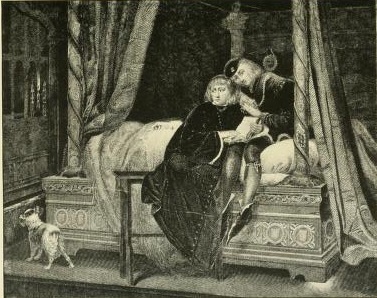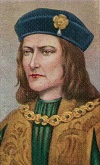Richard III
Please see the bottom of this page for full explanatory notes.
| ACT IV SCENE III | Another Room in the Palace. | |
| [Enter TYRREL] |
| TYRREL | The tyrannous and bloody deed is done. |
| The most arch of piteous massacre |
| That ever yet this land was guilty of. |
| Dighton and Forrest, whom I did suborn |
| To do this ruthless piece of butchery, |
| Although they were flesh'd villains, bloody dogs, |
| Melting with tenderness and kind compassion |
| Wept like two children in their deaths' sad stories. |
| 'Lo, thus' quoth Dighton, 'lay those tender babes:' |
| 'Thus, thus,' quoth Forrest, 'girdling one another | 10 |
| Within their innocent alabaster arms: |
| Their lips were four red roses on a stalk, |
| Which in their summer beauty kiss'd each other. |
| A book of prayers on their pillow lay; |
| Which once,' quoth Forrest, 'almost changed my mind; |
| But O! the devil--there the villain stopp'd |
| Whilst Dighton thus told on: 'We smothered |
| The most replenished sweet work of nature, |
| That from the prime creation e'er she framed.' |
| Thus both are gone with conscience and remorse; | 20 |
| They could not speak; and so I left them both, |
| To bring this tidings to the bloody king. |
| And here he comes. |
Enter KING RICHARD III. |
| All hail, my sovereign liege! |
| KING RICHARD III | Kind Tyrrel, am I happy in thy news? |
| TYRREL | If to have done the thing you gave in charge |
| Beget your happiness, be happy then, |
| For it is done, my lord. |
| KING RICHARD III | But didst thou see them dead? |
| TYRREL | I did, my lord. |
| KING RICHARD III | And buried, gentle Tyrrel? |
| TYRREL | The chaplain of the Tower hath buried them; |
| But how or in what place I do not know. | 30 |
| KING RICHARD III | Come to me, Tyrrel, soon at after supper, |
| And thou shalt tell the process of their death.
|
| Meantime, but think how I may do thee good, |
| And be inheritor of thy desire. |
| Farewell till soon. |
[Exit TYRREL. |
| The son of Clarence have I pent up close; |
| His daughter meanly have I match'd in marriage; |
| The sons of Edward sleep in Abraham's bosom, |
| And Anne my wife hath bid the world good night. |
| Now, for I know the Breton Richmond aims | 40 |
| At young Elizabeth, my brother's daughter, |
| And, by that knot, looks proudly o'er the crown, |
| To her I go, a jolly thriving wooer. |
| Enter RATCLIFF. |
| CATESBY | My lord! |
| KING RICHARD III | Good news or bad, that thou comest in so bluntly? |
| CATESBY | Bad news, my lord: Ely is fled to Richmond; |
| And Buckingham, back'd with the hardy Welshmen, |
| Is in the field, and still his power increaseth. |
| KING RICHARD III | Ely with Richmond troubles me more near |
| Than Buckingham and his rash-levied army. | 50 |
| Come, I have heard that fearful commenting |
| Is leaden servitor to dull delay; |
| Delay leads impotent and snail-paced beggary |
| Then fiery expedition be my wing, |
| Jove's Mercury, and herald for a king! |
| Come, muster men: my counsel is my shield; |
| We must be brief when traitors brave the field. |
| [Exeunt. |
Richard III, Act 4, Scene 4
_______
Explanatory Notes for Act 4, Scene 3
From King Richard III. Ed. Brainerd Kellogg. New York: Clark & Maynard.
Abbreviations. — A.-S. = Anglo-Saxon: M.E. = Middle
English (from the 13th to the 15th century) ; Fr. = French ;
Ger. = German ; Gr. = Greek ; Cf. = compare (Lat. confer) ;
Abbott refers to the excellent Shakespearean Grammar of Dr.
Abbott; Schmidt, to Dr. Schmidt's invaluable Shakespeare Lexicon.
____
2. Arch, chief (in wickedness).
6. Flesh'd villains, hardened in villainy. To flesh a dog was to reward him with a portion of the first game which he killed.
18.Replenished, perfect.
19. Prime, first.
30. It was generally supposed that Tyrrel ordered the two princes to be buried at the foot of the stairs leading to the chamber in which they were murdered. During some repairs in 1674, the workmen discovered about ten feet deep,
under a staircase in the White Tower, the bones of two boys of about twelve years of age, which were supposed to be
those of the two princes. The bones were interred in Westminster Abbey, by order of Charles II.
31. At after-supper. After-supper may be a prepositional compound (like after-noon), meaning the slighter repast which followed the more substantial meal; or at after may merely be equivalent to after, as clearly in Chaucer's Squieres Tale, 302: "At-after soper goth this noble king."
33. Abraham's bosom, a euphemism for the grave.
40. Breton, because he had fled for refuge to Brittany.
46. Bishop of Ely, who was kept in the custody of Buckingham at Brecknock, but made his escape to Richmond,
He was afterwards made Archbishop of Canterbury.
50. Rash-levied, hastily collected.
51. Fearful commenting, timid reasoning.
51-55. Timid thoughts are accompanied by tardy movements and indolent delay: delay brings along with it weakness and ruin, therefore let my policy be one of fiery enterprise and fierce dispatch.
56. My counsel is my shield, I do not deliberate, but fight.
How to cite the explanatory notes:
Shakespeare, William. Richard III. Ed. Brainerd Kellogg. New York: Clark & Maynard, 1886. Shakespeare Online. 20 Feb. 2014. < http://www.shakespeare-online.com/plays/richardiii_4_3.html >.
______
Related Articles
 Richard III: Plot Summary Richard III: Plot Summary
 Richard III: Q & A Richard III: Q & A
 Famous Quotes from Richard III Famous Quotes from Richard III
 Shakespeare's Sources for Richard III Shakespeare's Sources for Richard III
 Why Shakespeare is so Important Why Shakespeare is so Important
 Shakespeare's Language Shakespeare's Language
 Shakespeare's Boss: The Master of Revels Shakespeare's Boss: The Master of Revels
|

Notes on Richard III...
 Shakespeare's friend and fellow actor, Richard Burbage, amazed and delighted audiences with his stirring interpretation of the outrageous villain Richard III. On March 13, 1602, a lawyer and diarist named John Manningham recorded a now-famous anecdote about Shakespeare and Richard Burbage:
Shakespeare's friend and fellow actor, Richard Burbage, amazed and delighted audiences with his stirring interpretation of the outrageous villain Richard III. On March 13, 1602, a lawyer and diarist named John Manningham recorded a now-famous anecdote about Shakespeare and Richard Burbage:
"Upon a time when Burbage played Richard the Third there was a citizen grew so far in liking with him, that before she went from the play she appointed him to come that night unto her by the name of Richard the Third. Shakespeare, overhearing their conclusion, went before, was entertained and at his game ere Burbage came. Then, message being brought that Richard the Third was at the door, Shakespeare caused return to be made that William the Conqueror was before Richard the Third."
____
British geneticists at the University of Leicester announced this month they will soon try to sequence the genome of King Richard III. King Richard's corpse was discovered in 2012 under a parking lot in Leicester. Find out more on the Wellcome Trust website.
____
"Richard is the very personation of confidence in self-conduct and self-control, in his absolute command of every form of dissimulation, and still more difficult, of simulation. He is arrogant no less, on the strength of his superiority to any natural stirrings of love or pity, of terror or remorse. Like lago he believes in the absolute sway of will-wielded intellect to subject and mould passion to its own determinations, while both are, unconsciously to themselves, overmastered and enslaved by a tyrannous passion that ever keeps out of their own sight as if lurking- and shifting place behind them." William Lloyd. Read on...
Shakespeare acquired substantial wealth thanks to his acting and writing abilities, and his shares in London theatres. So how much money did Shakespeare make by selling Richard III? Read on...
____
"Because of its rapid recurrence of exciting scenes and incidents, its turbulent action, and the centering of the interest upon one chief personage [Richard III] is the greatest favorite of all the histories for the stage, is yet the poorest and thinnest in thought, the least free and harmonious in rhythm in a word, the least Shakespearean of them all. Compare it with Richard II which was written a year or two after it, and in which Shakespeare seems to have taken his first great step toward originality in style and in the treatment of his material." Richard Grant White. Read on...
____
Malmsey, a rich and sweet wine brought to England from Greece in the 16th century, is now produced on the island of Madeira. Shakespeare writes about Malmsey many times, but the most famous reference to Malmsey in all of literature can be found in Richard III, when Richard orders the execution of his brother, the Duke of Clarence. Richard's hired assassins decide to drown Clarence in a large cask (butt) of the brew. When they arrive at the Tower of London to carry out the task, the unsuspecting Clarence asks for a cup of wine. The Second Murderer offers this ghastly retort: "You shall have wine enough, my lord, anon" (1.4.153). Read on...
____
The 1995 film adaptation of Richard III, starring Ian McKellen, Annette Bening, Jim Broadbent and Robert Downey Jr. is
set in 1930s Britain. Ian McKellen won the BAFTA for his role as King Richard.
|
|

 Shakespeare's friend and fellow actor,
Shakespeare's friend and fellow actor,